- Popular Types of Bermuda Grass Explained - April 21, 2022
- When to Mow New Grass - April 18, 2022
- Best Troy Bilt Push Mower: How to Find The Right One - April 25, 2021
In this article, we look at the best types of grass seeds for New Jersey and the best grass seed products for the same region.
New Jersey is famous for many things that include the beautiful beaches, its cultural diversity, amazing food from many parts of the world, intense politics, and its ever-busy roads. It is also famous for its gorgeous scenery with amazing gardens and vast tracts of suburbia.
Lawn state and garden state are the other names that describe the beautiful small state. One of the things that make the gardens stand out with their immense beauty is the grass.
Types of the Best Grasses for New Jersey
New Jersey has several sections with varying terrain and soils. If a certain grass seed type works well on one section, it will not guarantee the same results in the next section. Several factors influence how a grass seed types fairs in each section.
For example, if you choose a grass seed for a region with heavy traffic, you need to find one that can withstand challenging demands such as fescue. Other factors that influence the grass you choose are your yard shade, the amount of sun you expose the grass too, and other conditions in your locality.
The best grasses for New Jersey come in two main categories: warm-season types of grass and cool-season grasses. Warm-season grasses thrive best in the southern zone of New Jersey. During the winter season, the grasses go dormant and sometimes turn brown.
Warm-season grasses have a coarse texture, and they do better when planted from plugs or sods than from seeds.
On the other hand, cool-season grasses thrive best in the northern zone of New Jersey. They have strong resistance to the cold weather, and most of them can handle sunny situations just as well but with occasional irrigation.
They are also more versatile, and you can plant them from seeds, grass sods, or plugs with successful results. The most common cool-season grasses include perennial ryegrass and Kentucky bluegrass.
Below are the grass seed types suitable for this zone.
Kentucky bluegrass
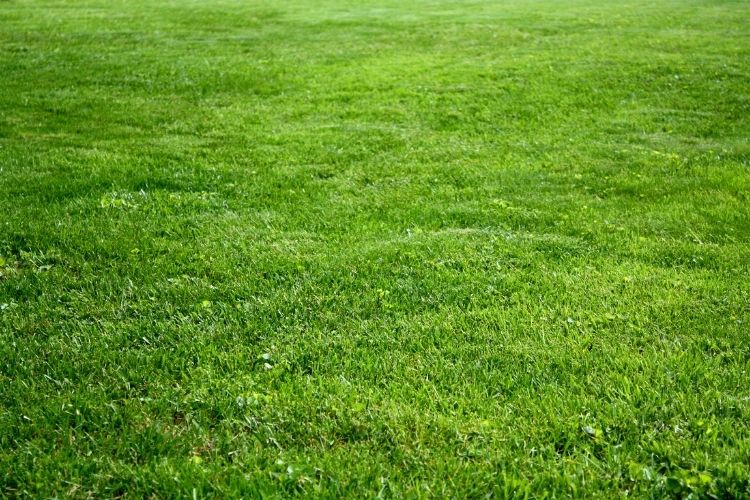
Kentucky bluegrass is the most popular grass type in New Jersey and many other states across the USA. Many homeowners love it for providing the perfect lawn made up of durable, lush, and dense grass. Even though the grass is beautiful to look at, it takes high maintenance and care to keep it looking good.
The bluegrass state, Kentucky, lays claim to Kentucky bluegrass even though the grass did not originate there. History has it that the grass type first appeared in Kentucky and other states across America as a pasture grass from northern Asia and Europe.
It still covers most of Kentucky’s rolling hills, and it is one of the most versatile grass types. In the grass industry, Kentucky bluegrass goes by KBG.
Characteristics
KBG is one of the best cool-season grass types and one of the most popular in New Jersey. It is perennial and grows most vigorously during the spring, fall, and cool seasons. Compared to all the other perennial cool-season grass types, KBG has the highest cold hardiness.
The grass is more prominent in moderate warm summers and it aligns well with cold winters.
Moreover, the grass has shallow roots that provide it with a much lower tolerance for drought and heat than other grass types. The shallow roots are also responsible for restricting widespread growth of the grass to zones with higher humidity and heat levels.
However, this does not prevent some KBG lovers from growing the grass and using heavy irrigation systems to keep it thriving through the scorching sun.
The grass tips have very distinctive boat-like tips and a rich emerald/blue-green color. It is beautiful to look at, feels soft on bare feet, and has an amazing medium to fine texture.
It does not germinate as fast as other cool-season grass types do, but it establishes quickly from the seed. Furthermore, the grass spreads readily through underground stems after establishing a thick, dense turf.
During the hot weather, KBG slows its growth significantly, and it goes completely dormant during extended drought or extreme hot seasons. However, the grass also springs back to life very fast with irrigation and good care. Overall, the grass has the best capacity to recuperate from any damage quickly because of its aggressiveness.
Care
Like many other cool-season grass types, the best time to plant KBG seeds in New Jersey is during the early fall because it peaks its growing fast.
The grass has a rhizome growth that leads to the easy and fast development of thatch, opening it up to diseases and drought stress. Dethatching your KBG often after one or two years will keep it looking good.
KBG needs lots of water to encourage root growth and thrive. Frequent shallow water irrigation is not a good care practice for the grass, as it does not lead to deep root growth. The KBG needs at least an inch of water weekly from either rainfall or irrigation during normal weather. The grass needs around two inches of water per week during the hot weather.
Pros
- Thick, lush, attractive, and fine-textured turf with good coverage
- Tolerates both full sunlight and cold weathers
- It has the fastest recovery time compared to other grass types
- It is durable
Cons
- It requires regular and high maintenance
- KBG the temperatures are too high, it goes dormant
- It takes time to germinate
- It does not do too well in overly wet or poorly shaded conditions
Perennial Ryegrass
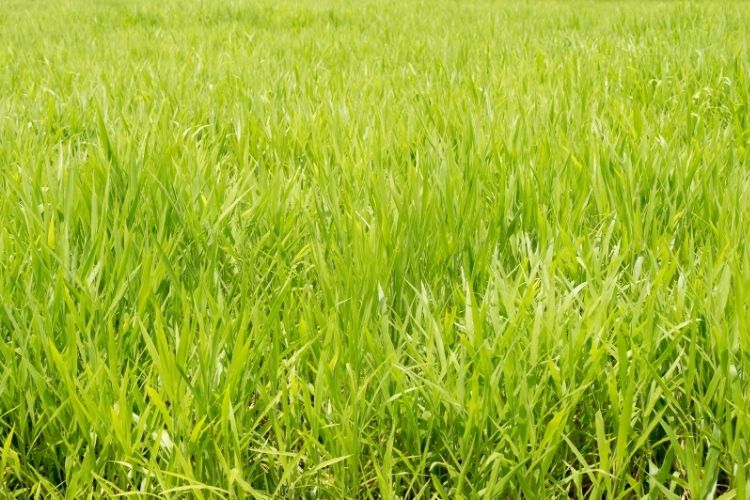
Another Grass seed popular in New Jersey lawns is the perennial ryegrass, which also goes by “Lolium Perenne”. Besides New Jersey, the grass is also popular in many other states across the USA, through its growth differs from one region to the next.
It is suitable for permanent and temporary lawns, and its fine blades and lush lawn that do not change its color irrespective of the weather conditions characterize it.
Perennial ryegrass is a cool-season grass just like the Kentucky bluegrass, but it is not as cold, hardy. Like many other grass types, perennial ryegrass is also a native of Europe and Asia that found its way to the American pastures areas. New Jersey citizens grow the grass for both pasture and home lawns.
Characteristics
The perennial ryegrass is one of the fastest germinating grass types, and with adequate water or rainfall, you can have it sprouting in two weeks and even in one week if the conditions are ideal.
The grass does not do well in dry conditions, but it withstands heavy use and traffic. It establishes quickly, making it the perfect choice for permanent and temporary lawns. The blades are fine, and it forms a lush lawn that maintains its color throughout the winter seasons.
Some of the perennial grass uses include short-term erosion control and color and, as a single season, temporary stability. In proper climates, perennial ryegrass establishes permanent lawns.
Moreover, being a cool-season grass, it has its peak growth during the cool seasons, the fall, and all the way to spring. It also does well in cool winters and moderate summers.
Like the KBG, perennial ryegrass exhibits shallow roots limiting their drought and heat tolerance. However, some improved perennial ryegrass varieties, developed through breeding and research programs, have better heat and drought tolerance. The improved grass seeds are also more traffic tolerant and require less water than other standard grass seeds per year.
Mowing for these varieties is also less than the standard grass type. Furthermore, the grass is also popular with athletic fields and transition zone lawns, and it dies just as well in shady and sunny conditions.
Care
Perennial ryegrass grows well alkaline, acidic, and other types of soils. The best soil pH for the seed type is between 5.5 and 7.5. The best time to plant your perennial ryegrass is during the cool season or in the fall.
The recommended mowing height for the grass is half to two and a half inches. The grass also requires a high fertilizer intake and frequent irrigation during low rainfall seasons. Furthermore, it recovers fast after going dormant for short periods.
Pros
- It is the best water-tolerant type amongst the other cool-season grass types
- It germinates quickly and one of the best choices for overseeding
- It produces the lowest thatch levels
- Helps with disease and wear tolerance when paired with other grass types
- Versatile-used on sports fields, home lawns, and on pasture fields
Cons
- It requires high maintenance
- Best for moderate temperatures, and it has a low tolerance for heat
- It has a low tolerance for drought and shade
- Over-seeding during the warm season can make it weedy
- If used alone, the grass becomes “stemy”
Fescues
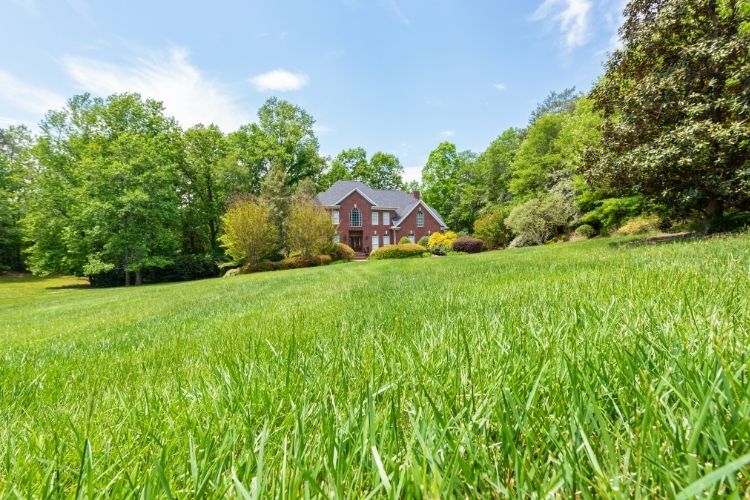
Fescues come in different types that you can blend for a beautiful lawn. The three that you can find in both northern and southern New Jersey are hard fescue, creeping red fescue, sheep fescue, and chewings fescue. Creeping red fescues are suitable for shady places, while hard fescue does better in dry and sandy soils, a common feature in southern New Jersey.
Chewings fescue has the most attractive lawns of all the fescues. The one thing the fescues share in common is low maintenance. However, this does not mean that the grass seed does not require any input to thrive. The collective name for the three fescues is fine fescue.
Like many other lawn types of grass in the USA, fescue is also a native of Europe, and their most dominant features are their extra thin blades and great tolerance to shade, which is why they also go by shade grass.
See how Fescue Grass compares to Bermuda in our full comparison.
Characteristics
Each fine fescue has the characteristics that tell it apart from the rest.
- Creeping red fescue adapts well in cold places and is strictly shade-tolerant. It does not do well if exposed to too much sun. The grass is slow spreading, and it uses its rhizomes to creep along with the lawn. It develops thatch fast, but core aeration helps to reduce that.
- Chewings fescue does better in a drier climate, and its ability to survive in the sun out passes that of creeping fescue. However, if the sun is too hot, the grass might not grow as expected. Furthermore, it does its best in the shade, does not spread, and exhibits a bunch of growth habits.
- Hard fescue also exhibits very fine blades, and it is just as shade tolerant as the other fescues. The major difference between hard fescue and the others is in color, which is very similar to the gray/green of buffalo grass. The grass type prefers drier climates, and it will not survive in consistently moist soils.
- Sheep Fescue is also shade tolerant, and it requires minimal maintenance making it popular among many cultivars. The grass does not even require any mowing.
Care
Fine fescues are not ideal for traffic places because of their low wear resistance. If you plant the grass in a place with low sunlight, it will lack rapid growth. Any damage occurring to the grass takes longer to repair. The best time to plant the fescues grass is during the fall or the cool weather.
Unlike some other grass types, fine fescue does not require too much fertilizer. Giving the grass nitrogen once a year during the fall is enough for it to grow healthy you can mow the grass when it is between two and three inches, but if you do not want it to grow, you can mow it at one and a half inches.
All the fescues prefer shaded soil, but you should ensure that the grass, irrespective of the type, gets enough water during drought conditions. Fescues are prone to insect damage, with the most common being grub worms and billbugs. An occasional spray of an insecticide helps to kill the bugs.
Besides insect damage, the grass type is also prone to dollar spots, a common grass fungal infection. The infection mostly occurs when nitrogen levels are low. One of the best ways to eradicate the disease is by raising the soil nitrogen levels or using the appropriate fungicides.
Other common diseases include leaf spot and red thread that mainly occur in damp and humid weather. In most cases, the disease goes away once the weather changes to warm. You can also use a fungicide to eradicate the same.
Pros
- It does not require too much maintenance
- Extensive dethatching is not necessary
- It can withstand wear and tear
- Unbeatable hardiness
- It does not need frequent mowing
Cons
- Susceptible to pests and diseases
- Blades are coarse for home lawns
The Best Grass Seed products for New Jersey
Scotts Turf Builder Grass Kentucky Bluegrass
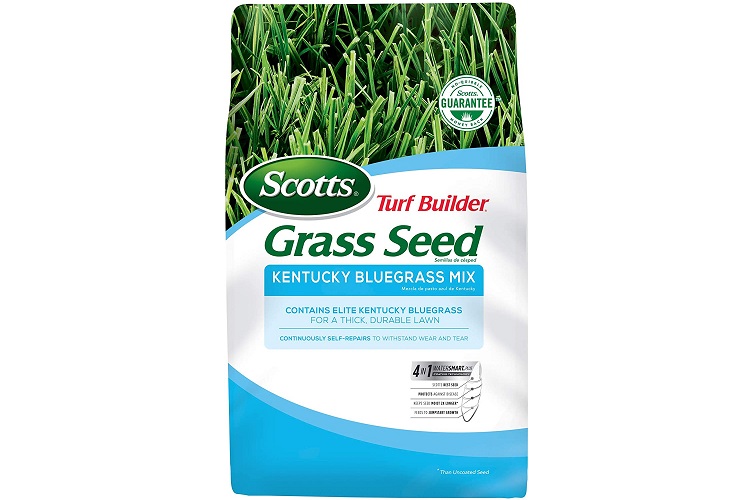
The Scotts Turf Builder Grass is a highly rated grass with fine blades and a thick and full texture. The seed germinates in between seven and fourteen days, and it is suitable for the new jersey high traffic areas. It grows well in moderate shade and sunny areas. One of the best characteristics of the grass is its self-repairing ability from any form of damage.
The seeds contain the company’s exclusive WaterSmart PLUS coating technology, which keeps them moist two times longer than the standard uncoated seeds.
The technology also helps jumpstart the grass germination, and it provides the seed with protection against fungal infections and diseases. The best time to plant Scotts turf is during the cool season, with temperatures ranging between 60 and 80 degrees Fahrenheit.
Pros
- Seeds germinate in two weeks or less
- It holds well in high traffic areas
- Does well in both shaded and sunny conditions
- Uses WaterSmart PLUS coating technology that protects it from diseases
- Conducive to cool temperatures and cold-tolerant
Cons
- The grass is a favorite with the birds
Scotts EZ Seed Patch & Repair Tall Fescue Lawns
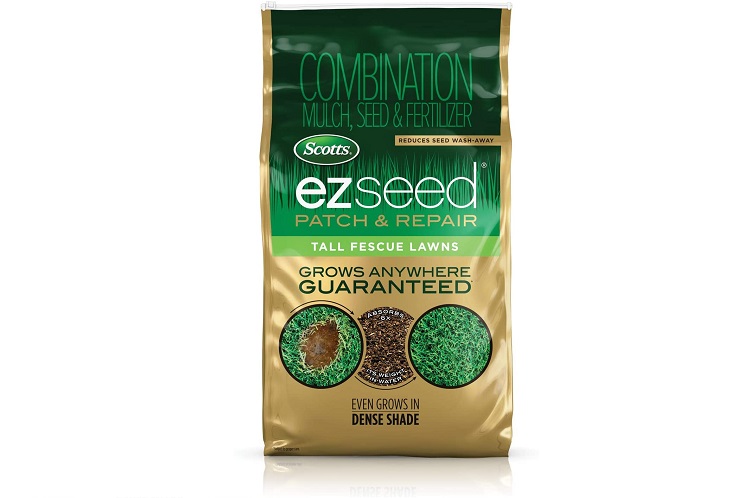
One of the best grass seeds in the market today is the Scotts EZ Seed that comes with high ratings and very positive reviews. The all-in-one product is a seed fertilizer package that provides homeowners with the ease of repairing bare spots on their lawns. The grass is ideal for high traffic areas. It also does better in densely shaded and sunny places.
The germination period for the grass seed varies from one region to the next and takes between 5 and 30 days, depending on the weather and other conditions.
The seeds also come with a tack lifter that prevents the seeds from washing away on sloped areas. The fertilizer release technology helps to jumpstart growth by feeding the seedlings.
Pros
- The product comes with everything you need to start growing your grass immediately. The only thing it does not come with is water
- Easy to use
- It comes in different size packages to suit your lawn space
- It comes with discounts for the larger packages
Cons
- Compared to other seed types, the Scotts EZ is slightly more expensive
WaterSaver Grass Mixture with Turf-Type Tall Fescue
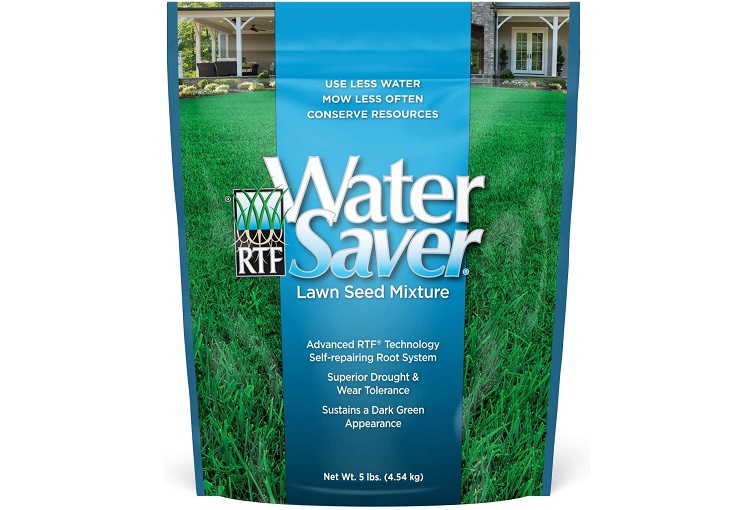
The WaterSaver Grass Mixture with Turf-Type Tall Fescue is one of the fastest germinating grass seeds on the market. It is also the perfect choice for homeowners to fill their bare spots without any fuss. The grass has deep roots that allow it to withstand heavy traffic.
The seeds also come with positive reviews from customers that they do everything they claim to do.
The best time to plant the seed is during the cool weather or in the morning when they can get the morning sun alongside shade. However, even when exposed to the sun every day, the seeds will still produce excellent results.
The growth rate is steady once the roots are set, and after germination, you can let the grass grow for three to four weeks before mowing. If you want your grass to thrive, even more:
- Water it once a week, as it needs little water. You might notice some drying during the hot season, but that should not worry you.
- Give the seeds some water, and they will look as good as new.
- Keep the grass at one to one and a half inches tall if you want it to look perfect.
Pros
- The seeds are self-repairing in the case of any damage
- The grass maintains a fine texture, and you do not have to worry about any weed infestation
- It produces a lush and thick lawn in both sunny and shaded conditions
- Easy to use
- It does not need too much water to thrive
Cons
- During very harsh sunny days, the grass may show signs of drying
Jonathan Green Heavy Traffic Grass Seed
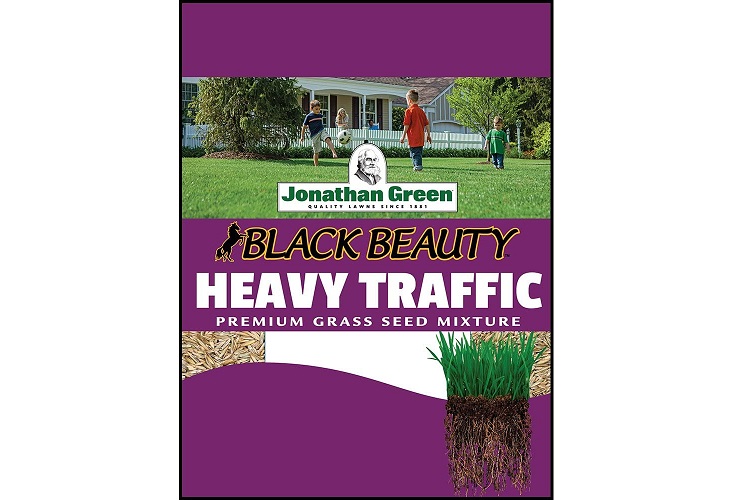
The Jonathan Green Heavy Traffic Grass Seed is ideal for homes with kids and pets. It is a heavy-traffic premium mixture of perennial ryegrass and fescue. The combination boosts abrasion resistance, and it provides the seeds with a protective cover against any other damage.
Amino acids emitted by fescue act as herbicides that help to curb broadleaf and crabgrass weed during the growth stage of the grass.
The seeds are also naturally resistant to insects, and their germination period is short. The ideal period to grow the grass mixture is during the cool season in healthy and moist soil. It is shade tolerant, and it does well even during the summer. Furthermore, it is a low-maintenance grass seed, making it the perfect choice for heavy traffic homes.
Pros
- It does not require high maintenance
- Fills up the lawn with thick, lush grass
- It produces a rich green color, which is beautiful to the eye
- Tolerance to heavy traffic
- Does well in both cool and sunny conditions
- Germinates fast
- Resistant to abrasion
- Contains herbicide
- Disease resistant
Cons
- Demands frequent watering
- Slightly expensive
Overall best grass seed for New Jersey-Verdict
Scotts Turf Builder Grass is the best overall grass seed. Besides Scotts being a reputable brand that you can trust for quality, the seeds produce excellent results, and they come with self-repairing abilities. Moreover, the seeds have a coating made with advanced technology that protects them and provides them with excellent water absorbency.
However, if you have heavy traffic in your home, the best option is the Jonathan Green Heavy Traffic Grass Seed.
FAQs
Answer: The first thing you should know before you purchase your grass seed is to find out about the climatic conditions of your region. Some grass seeds do not do well in sunny or hot weather conditions, while others flourish in both cool and sunny conditions. Ensure that you read the label for confirmation that you are buying the right seeds for your zone.
You should also know the type of lawn you need because some of the grass seeds will produce thick, lush, and green lawns while others will give you long grass. Furthermore, you can also buy mixed seed grasses that might not give you a uniform lawn.
If your lawn is susceptible to pests, you might need to go with the blends because they come with pest and disease control abilities.
Answer: Yes, spring or fall is the ideal period to plant your grass seeds. The climate during this period is excellent, and most of the seed types germinate faster and healthier in environments that are not too cold or too hot.
During this period, the soils are semi-warm, with moderate temperatures during the day and cool evenings, which is the perfect weather recipe for germination.
Answer: Before germination, the seeds need watering once or twice a day, depending on the weather conditions of your locality. Ensure that the top layer stays moist at all times, irrespective of where you live.
Switch to watering the seedlings once every other day once the seedlings attain the one-inch height. Once the grass establishes, you can water weekly or bi-weekly.
Answer: Yes, soil preparation is crucial if you want to grow lush, healthy grass. Preparing the soil helps break it, remove weeds, rocks, and sticks, paving the way for fuss-free germination of the seeds. Soil preparation also provides you with the best opportunity to add slow-release fertilizer before planting your grass seeds for a healthier lavish lawn.
Wrapping it up
If you are looking for the best grass seeds for New Jersey, you should go with the cool-season grasses to have better performance in the region. They are not as vulnerable as the warm season grasses, and they can withstand several weather conditions and heavy traffic.
Furthermore, you will not go through the agony of replanting grasses after every season because they can withstand winter and summer. If you live in the southern part of New Jersey, you can choose to go with the warm season and cool-season grasses.

